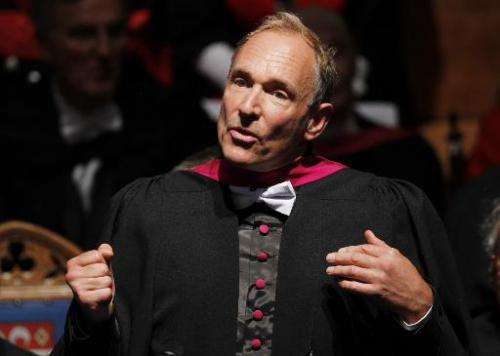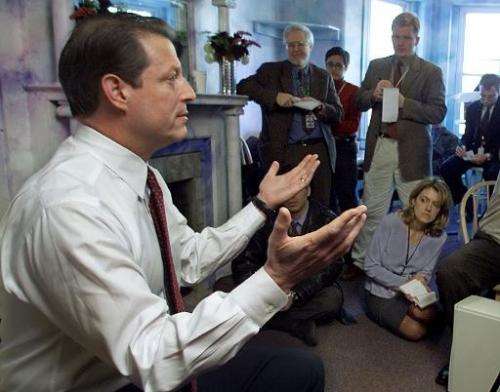World Wide Web turns 25 years old

Twenty-five years ago, the World Wide Web was just an idea in a technical paper from an obscure, young computer scientist at a European physics lab.
That idea from Tim Berners-Lee at the CERN lab in Switzerland, outlining a way to easily access files on linked computers, paved the way for a global phenomenon that has touched the lives of billions of people.
He presented the paper on March 12, 1989, which history has marked as the birthday of the Web.
But the idea was so bold, it almost didn't happen.
"There was a tremendous amount of hubris in the project at the beginning," said Marc Weber, creator and curator of the Internet history program at the Computer History Museum in Silicon Valley.
"Tim Berners-Lee proposed it out of the blue, unrequested."
At first, said Weber, the CERN colleagues "completely ignored the proposal."
Web had rivals
The US military began studying the idea of connected computer networks in the 1950s, and in 1969 launched Arpanet, the forerunner to the Internet. But the World Wide Web was just one of several ideas to connect the public.
Berners-Lee convinced CERN to adopt his system, demonstrating its usefulness by compiling a lab phone book into an online index.
A key aspect of the design put forward by Berners-Lee was that it worked across various computer operating systems. And it offered the ability to click on links to access files hosted on computers located elsewhere.
The Web was not a winner out of the gate. There were rival online services such as US-based CompuServe and France's Minitel but they involved fees, while Berners-Lee's system was free.
"It started as a real underdog; no one would have predicted the system would have succeeded," Weber said.
The Gopher system owned by the University of Minnesota was beating the Web in the early 1990s.

Al Gore, White House help
Weber credited former US vice president Al Gore with helping the Web topple Gopher by getting government agencies in Washington to use the system.
The launch of the Whitehouse.gov website was seen as a huge stamp of approval for the Web.
In 1993, the Web system was released free into the public, while those behind Gopher started charging, according to Weber.
"Most people don't realize that both the Web and the Internet had competitors," Weber said.
"Had they lost the battles, we would still be going online, but it could certainly be different, a lot more top-down control like the walled garden at Facebook."
Web competitors were online environments controlled by operators.
Under the Berners-Lee model, people were free to publish what they wished on Internet-linked computers.
Internet titans such as Google and Yahoo were built on helping people find pages of interest as the amount of information being hosted on servers exploded.

Disrupting industries
"At its birth, many of us were guilty of a lack of imagination and just didn't see what the Web would do to the future," Gartner analyst Michael McGuire told AFP.
"The personal computer changed the way we work, but is was the Web that disrupted and changed a lot of industries."
The ability to freely access files on the Web has shaken traditional business models in music, film, news and more.
"The Internet pushes power to the edges," said Jim Dempsey, vice president for public policy at the US-based Center for Democracy & Technology.
"Anybody can be a listener and anybody can be a publisher on the same network; there has never been anything like it."
A powerful underlying tenet of the Web is that it is egalitarian and open, but those principles are under threat, according to Dempsey.
It remains to be seen whether the Web is hobbled with regulations and fragmented by governments walling off portions in countries.

Freedom threatened
"You will never stop the teenage kid from watching little snippets of cute cats," Dempsey said.
"The trouble is you could limit the ability of people to criticize the government or make a tiered Internet in which it is harder for innovators, critics, or human rights activists to reach a global audience."
Threats to a Web based on equality concern its creators, according to Weber.
While the Web unified the Internet decades ago, there is nothing "written in stone" saying it can't fragment anew, the historian reasoned.
In the US, major Internet service providers have won the right to give some online traffic preferential treatment, and governments have shown willingness to invade online privacy or restrain Web freedom.
A big battle for the shape of the Web could be the effect of billions more people getting online with smartphones in parts of developing parts of the world.
"The Web is really only half built; it is not worldwide yet," Weber said.

Timeline of World Wide Web
While some concepts of the Internet date back to the 1950s, the public-facing World Wide Web traces its history back 25 years.
Here is a timeline:
March 12, 1989: British computer scientist Tim Berners-Lee circulates his "informational management proposal" at the European organization CERN, laying the foundation for the World Wide Web. He releases the code to the public on Christmas Day 1990.
1993: Mosaic, the browser credited with popularizing the Web with an intuitive interface, is developed by a team led by Marc Andreessen at the University of Illinois. Mosaic is the basis for the commercial browser Netscape in 1994.
1994: China gets first Internet connection, but filters content.
- The White House launches its website, www.whitehouse.gov; some users who enter a .com address end up at a porn site.
- Launches include "David and Jerry's Guide to the World Wide Web," the forerunner to Yahoo, and Amazon.com.
1995: Microsoft releases Internet Explorer, touching off a "browser war" which eventually will kill off Netscape.
- The online auction site eBay is launched.
1996: Finland's Nokia launches first mobile phone with Internet connectivity.
1998: Google begins operations, quickly growing into the leading search engine.
- The US government hands over control of the Web domain system to the Internet Corporation for Assigned Names and Numbers, a private entity.
2000: The Internet virus ILOVEYOU infects millions of computers around the world, causing billions of dollars in damage and highlighting the need for online security.
- Internet fever drives the tech-dominated Nasdaq composite index to a record high of 5,048, ahead of the bursting of the dot-com bubble, eroding more than 75 percent of the Nasdaq value by 2002. The index fails to reach 5,000 over the next 14 years.
2001: Napster, a wildly popular music-swapping service, is ordered shuttered by the US courts in a key ruling on online copyrights.
2002: A denial of service knocks out eight of 13 root servers that allow for Internet connections.
2005: The number of people connected to the Internet tops one billion.
2007: Estonia conducts the first online parliamentary election.
2012: Online commerce for 2012 tops $1 trillion, according to private surveys.
- The social network Facebook reaches one billion members; A NASA probe checks in on Foursquare from Mars.
- A global telecom treaty is signed by 89 UN member states, with some countries claiming the US has too much control of the Internet. The United States and 55 other countries reject the document, saying it could lead to government regulation of the Internet.
2013: Some 2.7 billion people worldwide are connected to the Internet, around 40 percent of the world's population. Chinese overtakes English as the dominant language.
© 2014 AFP



















